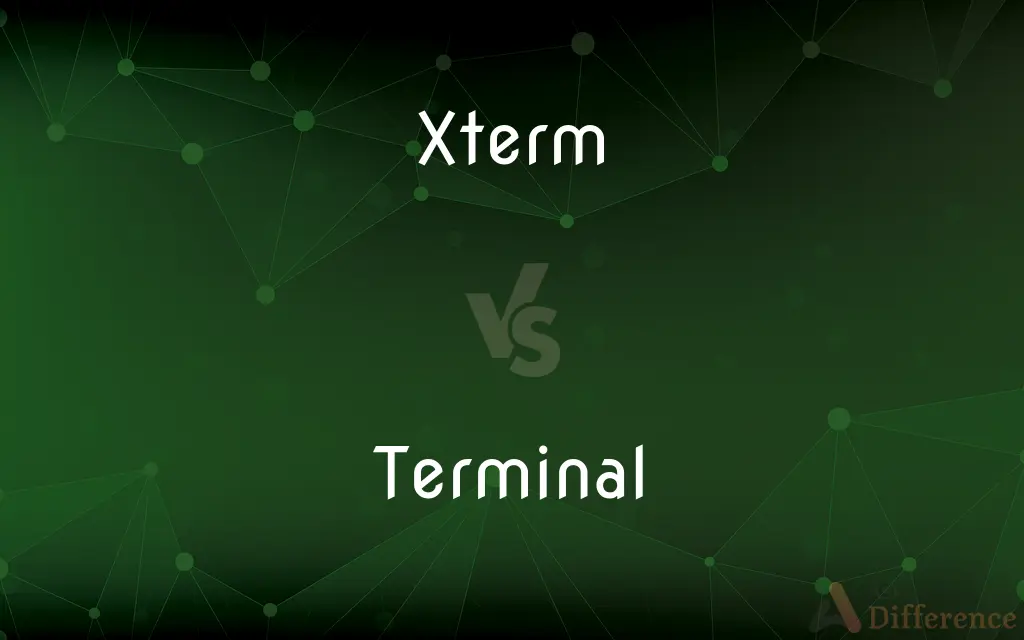Xterm vs. Terminal — What's the Difference?
By Fiza Rafique & Urooj Arif — Updated on April 18, 2024
Xterm is a terminal emulator for the X Window System, displaying text and graphics, while Terminal generally refers to interfaces that allow user interaction with operating systems.

Difference Between Xterm and Terminal
Table of Contents
ADVERTISEMENT
Key Differences
Xterm was specifically designed for the X Window System, providing a graphical interface for user interaction with Unix-like operating systems. In contrast, Terminal is a broader term that refers to any command-line interface or graphical terminal emulator used across different operating systems.
While Xterm supports features like session management and customization, which are critical in graphical environments, Terminal applications may vary widely in their capabilities depending on the system, with some offering advanced customization and scripting features.
Xterm uses X11 for its display, which allows it to be highly configurable with various fonts and colors. Conversely, Terminal programs on different platforms might rely on other systems for rendering and might not offer the same level of configuration.
Moreover, Xterm is known for its ability to handle complex character encoding and multiple languages, making it suitable for diverse programming and computing needs. On the other hand, some Terminal applications might not support such wide encoding options, focusing instead on basic command execution.
Xterm allows for detailed manipulation of its appearance and behavior through resource files and command-line options. Terminal emulators in other environments, like Windows or macOS, might not provide as detailed customization options, focusing more on general usability and integration with the operating system.
ADVERTISEMENT
Comparison Chart
Primary System
X Window System
Various OS interfaces
Customization
High (fonts, colors, etc.)
Varies; often less than Xterm
Encoding Support
Wide (multiple languages and characters)
Varies; generally basic
Typical Use
Advanced users, developers
General users, system administration
Key Capabilities
Session management, detailed configuration
Command execution, basic customization
Compare with Definitions
Xterm
Capable of displaying both text and basic graphics.
Xterm can render text and simple graphics through escape sequences.
Terminal
Used for system administration and file management.
Terminal commands can manipulate files and configure network settings.
Xterm
Supports VT102 and Tektronix 4014 compatible modes.
Xterm's compatibility modes are useful for specific applications.
Terminal
Often integrated into the operating system.
Terminal applications are usually a standard part of any OS installation.
Xterm
Highly customizable through resource files.
Xterm users can change fonts and colors by editing resource files.
Terminal
Varies in capability based on the operating system.
Terminal on macOS includes features like Spotlight search integration.
Xterm
Utilizes the X11 display protocol.
Xterm's use of X11 allows for network transparency.
Terminal
A general interface for interacting with a computer's operating system.
The Terminal provides access to the system's command line.
Xterm
A terminal emulator for the X Window System.
Xterm allows users to execute Unix commands in a graphical environment.
Terminal
Can refer to both hardware (physical terminal) and software (terminal emulator).
Terminal emulation software mimics the function of a physical terminal.
Xterm
In computing, xterm is the standard terminal emulator for the X Window System. A user can have many different invocations of xterm running at once on the same display, each of which provides independent input/output for the process running in it (normally the process is a Unix shell).xterm originated prior to the X Window System.
Terminal
Forming or situated at the end or extremity of something
The terminal tip of the probe
A terminal date
Terminal
(of a disease) predicted to lead to death, especially slowly; incurable
Terminal cancer
Terminal
Done or occurring each school, college, university, or law term
Terminal examinations
Terminal
The end of a railway or other transport route, or a station at such a point
A freight terminal
A ferry terminal
Terminal
A point of connection for closing an electric circuit
Battery terminals
Terminal
A device at which a user enters data or commands for a computer system and which displays the received output.
Terminal
Another term for terminus (sense 3 of the noun)
Terminal
A patient suffering from a terminal illness.
Terminal
Of, at, relating to, or forming a limit, boundary, extremity, or end
The terminal moraine of a glacier.
Terminal
(Botany) Growing or appearing at the end of a stem, branch, stalk, or similar part.
Terminal
Of, at, relating to, or being the end of a section or series; final.
Terminal
A building in an airport where passengers transfer from ground transportation to the facilities that allow them to board airplanes.
Terminal 1 is for domestic flights, whereas Terminal 2 is for international flights.
A shuttle service runs free of charge between the three terminals.
Terminal
A harbour facility where ferries embark and disembark passengers and load and unload vehicles.
Terminal
A rail station where service begins and ends; the end of the line. For example: Grand Central Terminal in New York City.
Terminal
A rate charged on all freight, regardless of distance, and supposed to cover the expenses of station service, as distinct from mileage rate, generally proportionate to the distance and intended to cover movement expenses.
Terminal
A town lying at the end of a railroad, in which the terminal is located; more properly called a terminus.
Terminal
A storage tank for bulk liquids (such as oil or chemicals) prior to further distribution.
Terminal
(electronics) the end of a line where signals are either transmitted or received, or a point along the length of a line where the signals are made available to apparatus.
Terminal
An electric contact on a battery.
Terminal
(telecommunications) The apparatus to send and/or receive signals on a line, such as a telephone or network device.
Terminal
(computing) A device for entering data into a computer or a communications system and/or displaying data received, especially a device equipped with a keyboard and some sort of textual display.
Terminal
(computing) A computer program that emulates a physical terminal.
Terminal
(computing theory) A terminal symbol in a formal grammar.
Terminal
(biology) The end ramification (of an axon, etc.) or one of the extremities of a polypeptide.
Terminal
Fatal; resulting in death.
Terminal cancer
Terminal
Appearing at the end; top or apex of a physical object.
Terminal
Occurring at the end of a word, sentence, or period of time, and serves to terminate it
Terminal
(archaic) Occurring every term; termly.
A student's terminal fees
Terminal
To store bulk liquids (such as oil or chemicals) in storage tanks prior to further distribution.
Terminal
Of or pertaining to the end or extremity; forming the extremity; as, a terminal edge.
Terminal
Growing at the end of a branch or stem; terminating; as, a terminal bud, flower, or spike.
Terminal
Pertaining to a railroad terminal; connected with the receipt or delivery of freight; as, terminal charges.
Terminal
That which terminates or ends; termination; extremity.
Terminal
Either of the ends of the conducting circuit of an electrical apparatus, as an inductorium, dynamo, or electric motor, usually provided with binding screws for the attachment of wires by which a current may be conveyed into or from the machine; a pole.
Terminal
The end of a line of railroad, with the switches, stations, sheds, and other appliances pertaining thereto.
Terminal
The station at either end of a bus line line which transports freight or passengers.
Terminal
A station where passenger buses start or end a trip; - also called bus terminal.
Terminal
The structure at an airport where passengers board or debark, and where ticket purchases and baggage pickup is performed; - also called airline terminal.
Terminal
An electronic device where data may be entered into a computer, and information received from it, usually consisting of a keyboard and video display unit (monitor); the terminal may be integrated or connected directly to a computer, or connected by a communications circuit with a computer at a remote location; - also called computer terminal.
Terminal
Station where transport vehicles load or unload passengers or goods
Terminal
A contact on an electrical device (such as a battery) at which electric current enters or leaves
Terminal
Electronic equipment consisting of a device providing access to a computer; has a keyboard and display
Terminal
Being or situated at an end;
The endmost pillar
Terminal buds on a branch
A terminal station
The terminal syllable
Terminal
Of or relating to or situated at the ends of a delivery route;
Freight pickup is a terminal service
Terminal charges
Terminal
Relating to or occurring in a term or fixed period of time;
Terminal examinations
Terminal payments
Terminal
Occurring at or forming an end or termination;
His concluding words came as a surprise
The final chapter
The last days of the dinosaurs
Terminal leave
Terminal
Causing or ending in or approaching death;
A terminal patient
Terminal cancer
Common Curiosities
How does Terminal differ across systems?
Terminal functionality and appearance can vary significantly across different operating systems, tailored to system-specific commands and tools.
What makes Terminal unique on macOS?
On macOS, Terminal integrates closely with the system, offering features like seamless window management and Spotlight search.
What are the main advantages of using Xterm?
Xterm offers extensive customization and precise control over terminal sessions, ideal for advanced users.
What is Xterm used for?
Xterm is used to provide a graphical terminal interface within the X Window System environment.
Can I use Xterm for web development?
Yes, Xterm can be effectively used for web development, especially when managing remote servers.
Is Xterm compatible with Windows?
Xterm can be used on Windows through third-party software that emulates the X Window System, like Cygwin.
What is the main purpose of a Terminal?
The main purpose of a Terminal is to allow users to execute commands, administer their systems, and script automation tasks.
Can Terminal handle multiple sessions?
Many Terminal emulators, including those on macOS and Linux, support multiple sessions through tabs or windows.
Can Xterm run on any operating system?
Xterm primarily runs on systems that support the X Window System, commonly Unix and Linux distributions.
Which is more user-friendly, Xterm or typical Terminal apps?
Typical Terminal apps tend to be more user-friendly, especially for those not requiring extensive customization.
Is Terminal available on all computers?
Some form of Terminal is available on nearly all modern computers, though its functionality and design will differ.
How do I customize Xterm?
Customization in Xterm is done through modifying resource files and utilizing various command-line options.
Do Terminal applications support programming environments?
Yes, most Terminal applications support programming environments but may vary in the level of support for different programming languages.
What is the difference in resource usage between Xterm and other Terminal applications?
Xterm may use more resources due to its extensive customization options and graphical support, whereas other Terminals might be more lightweight.
Is there a performance difference between Xterm and Terminal?
Performance can vary; Xterm is highly optimized for X environments, while other Terminals might be optimized for specific system integrations.
Share Your Discovery

Previous Comparison
Covenanter vs. Covenantor
Next Comparison
Alcohol vs. AldehydeAuthor Spotlight
Written by
Fiza RafiqueFiza Rafique is a skilled content writer at AskDifference.com, where she meticulously refines and enhances written pieces. Drawing from her vast editorial expertise, Fiza ensures clarity, accuracy, and precision in every article. Passionate about language, she continually seeks to elevate the quality of content for readers worldwide.
Co-written by
Urooj ArifUrooj is a skilled content writer at Ask Difference, known for her exceptional ability to simplify complex topics into engaging and informative content. With a passion for research and a flair for clear, concise writing, she consistently delivers articles that resonate with our diverse audience.
















































